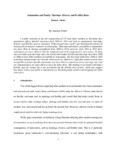| dc.rights.license | In Copyright | en_US |
| dc.creator | Weber, Madelyn Jane | |
| dc.date.accessioned | 2021-05-13T13:56:03Z | |
| dc.date.available | 2021-05-13T13:56:03Z | |
| dc.date.created | 2021 | |
| dc.identifier | WLURG38_Weber_ECON_2021 | |
| dc.identifier.uri | http://hdl.handle.net/11021/35203 | |
| dc.description | Thesis; [FULL-TEXT FREELY AVAILABLE ONLINE] | en_US |
| dc.description | Madelyn Jane Weber is a member of the Class of 2021 of Washington and Lee University. | en_US |
| dc.description.abstract | I exploit variation in the job composition of US local labor markets to determine how automation affects familial outcomes from 1980 to 2019 and look at employment, marriage, divorce, and fertility rates as outcomes. Following previous work, I use historical prevalence of routine jobs to measure exposure to automation. I find that individuals susceptible to automation are more likely to become unemployed from 2000 to 2010; however, from 2010 to 2019 these individuals are more likely to become employed and work comparatively more hours. Fertility rates correlate with marriage rates; the results show higher fertility and marriage rates from 1990 to 2000 in local labor markets susceptible to automation, but this trend shifts from 2000 to 2019 as fertility and marriage rates become relatively lower. Moreover, I find that women in areas most susceptible to female-specific automation are more likely to experience lower marriage rates and are simultaneously are more likely to leave the labor force. This finding is correlated with higher fertility rates for women but is not correlated with the fertility rates of men, which may suggest that many women susceptible to automation are becoming single mothers and dropping out of the labor force. | en_US |
| dc.description.statementofresponsibility | Madelyn Weber | |
| dc.format.extent | 35 pages | en_US |
| dc.language.iso | en_US | en_US |
| dc.rights | This material is made available for use in research, teaching, and private study, pursuant to U.S. Copyright law. The user assumes full responsibility for any use of the materials, including but not limited to, infringement of copyright and publication rights of reproduced materials. Any materials used should be fully credited with the source. | en_US |
| dc.rights.uri | http://rightsstatements.org/vocab/InC/1.0/ | en_US |
| dc.subject.other | Washington and Lee University -- Honors in Economics | en_US |
| dc.title | Automation and Family: Marriage, Divorce, and Fertility Rates (thesis) | en_US |
| dc.type | Text | en_US |
| dcterms.isPartOf | RG38 - Student Papers | |
| dc.rights.holder | Weber, Madelyn | |
| dc.subject.fast | Automation | en_US |
| dc.subject.fast | Labor market | en_US |
| dc.subject.fast | United States | en_US |
| dc.subject.fast | Marital status | en_US |
| dc.subject.fast | Families | en_US |
| dc.subject.fast | Fertility, Human--Economic aspects | en_US |
| local.department | Economics | en_US |
| local.scholarshiptype | Honors Thesis | en_US |
